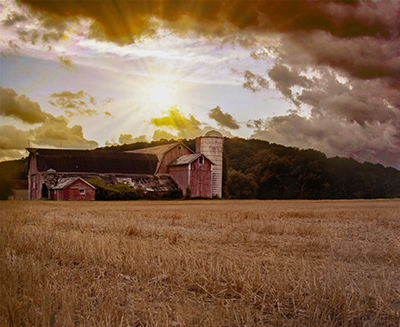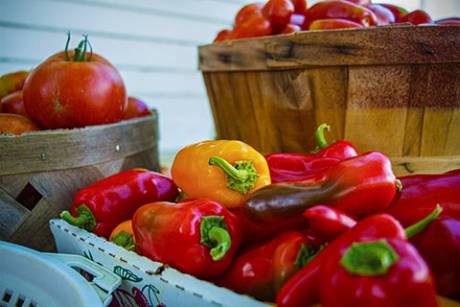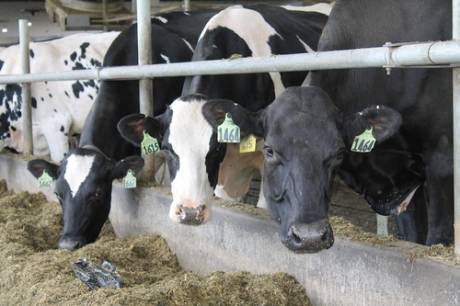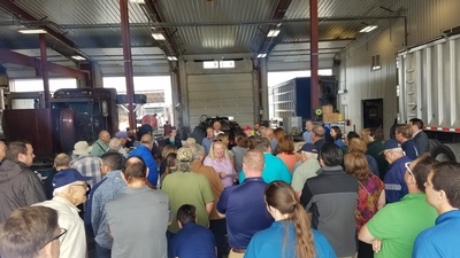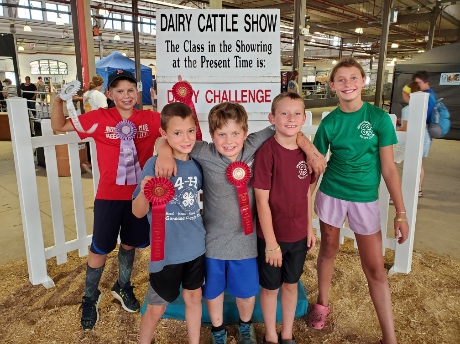Press release:
Standing amidst a swarm of advocates, at the Rochester Beekeepers Association’s beehives at Tinker Nature Park, U.S. Senator Charles E. Schumer today revealed how a recent under-the-radar decision on bees could sting Upstate, the Rochester-Finger Lakes Region, its local agriculture efforts, and even a budding jobs niche that supplies summer farmers’ markets and local restaurants.
Schumer detailed a recent fed decision by the United States Department of Agriculture (USDA) to stop collecting data on honeybees that puts the species and Upstate New York’s economy, at risk. Schumer said that the Rochester-Finger Lakes Region is a hive of productivity, but that this recent decision by the feds could derail much of what keeps Upstate competitive and robust as an agricultural hub.
Calls on USDA to 'reverse course immediately'
The senator called on the USDA to reverse course immediately, and instead, step up their work on bee populations. He revealed numbers that proved his point and hit home the critical importance of honeybees to Upstate New York and the Rochester-Finger Lakes Region’s agriculture sector.
“It sure helps, but you don’t need to be a beekeeper to understand the benefit pollinating bees have on the Upstate economy and the Rochester-Finger Lakes Region,” Schumer said. “Look around and you will see that they boost an agricultural hive of economic productivity.
"From farmers’ markets, to farm-to-table restaurants, to the farms and apple and cherry orchards that solidify the Rochester-Finger Lakes area as an agricultural hub, we have a lot to tout —and it is because of bees like these. So to find out that, in an under-the-radar move from Washington, the USDA has clipped the wings of a critical data-collection program on honeybee colonies, impacting jobs and productivity in places like Rochester, really stings.”
Schumer explained that earlier this July, USDA said it would stop collecting data for its "Honey Bee Colonies" report. The "Honey Bee Colonies" report, conducted by USDA’s National Agricultural Statistics Service, is released on an annual basis and contains critical data, tracking active honeybee colonies, new colonies and lost colonies.
The senator called the decision to suspend data collection for the report especially concerning, considering the devastating honeybee colony losses experienced in the United States over the past few decades.
Plummeting honeybee colonies
According to a report from USDA, the number of active honeybee colonies plummeted from six million in the 1940s to roughly 2.5 million in 2017. More recently, during the winter of 2018, beekeepers suffered their worst losses on record.
Data from the University of Maryland’s Bee Informed Partnership shows that beekeepers lost 37.7 percent of their colonies during this season, 8.9 percent higher than the average for winter. Schumer argued that this historic population decline shows that USDA should ratchet up its honeybee data collection, not shut it down.
Schumer said that New York State and the Rochester-Finger Lakes Region have not been immune to the devastation of honeybee colonies.
According to the most recent "Honey Bee Colonies" report released by USDA, between January and December of 2017, New York State beekeepers lost a total of 17,700 colonies of honeybees. Meanwhile, in the first six months of 2018, New York State beekeepers lost 7,000 colonies.
Schumer said these losses, combined with the fact that according to a June 2018 New York State Department of Agriculture report, crops dependent on honeybee pollination are worth $1.2 billion annually to the state, present a critical need to understand what exactly is causing them and how they can be reversed. This data is critical to protecting the honeybee-reliant Upstate New York agricultural industry.
Upstate ag is 'honeybee-reliant'
“We need this data to keep New York as an agricultural juggernaut,” added Schumer. “What’s the real stinger here is that the bees are part of the economy. They keep local businesses and jobs buzzing. To enact a new policy that discounts bees and their impact on New York is bad environmental, economic and agricultural policy. We are here today to say: reverse the decision, and instead step things up as this insect’s population spirals.”
The dwindling bee population is of particular concern for the Rochester-Finger Lakes Region’s agricultural industry, which is a hive of economic activity.
According to USDA, $234,935,000 worth of agricultural products were sold out of Genesee County in 2017; $221,295,000 worth of agricultural products were sold out of Wayne County in 2017; $205,160,000 worth of agricultural products were sold out of Ontario County in 2017; $155,282,000 worth of agricultural products were sold out of Orleans County in 2017; and $76,643,000 worth of agricultural products were sold out of Monroe County.
Furthermore, in 2017, Wayne County was home to 25,939 acres of non-citrus fruit and nut farms with 185 total farms; Ontario County was home to 1,384 acres of non-citrus fruit and nut farms and 53 total farms; Orleans County was home to 57 total farms; Genesee County was home to 21,927 acres of vegetable production; and Monroe County was home to 1,100 acres of non-citrus fruit and nut farms and 44 total farms.
New York ranks second in the nation in apple production, and Wayne and Orleans counties are the two top apple-producing counties in the state, meaning the bee population is imperative to the sustainability of this critical agricultural sector in the Rochester-Finger Lakes Region.
Wayne County produces more apples than any other county in New York State, and nationally ranks as the fourth-highest apple-producing county in the country. More than 25,000 acres of farm land in Wayne County is devoted to apples, which accounts for over half of the total apple acreage in all of New York State.
Prospect of extinction
The prospect of the extinction of honeybees also presents a significant to challenge to New York State’s burgeoning honey industry. In 2017 alone, 3,046,315 pounds of honey were collected from New York State farms and sales totaled $8,660,000. Schumer said that should honeybee colony numbers continue plummeting, not only would these sales be jeopardized, but Rochester-Finger Lakes restaurants and farmers’ markets would be forced to pay more for or completely stripped of the freshest, locally sourced honey.
Schumer explained that these dire numbers show the absolute necessity of USDA’s "Honey Bee Colonies" report. Therefore, Schumer urged the USDA to reverse course and maintain the collection of data for the "Honey Bee Colonies" report, to accurately track honeybees in the United States and protect Rochester-Finger Lakes agriculture from getting stung.
Advocates rally: beekeepers, farm-to-table restaurateurs, growers and educators
Schumer was joined by Pat Bono (beekeeper/owner of Seaway Trail Honey, director for NY Bee Wellness, an educational 501c3, and organizer of Rochester Beekeepers), Tim Pratt (beekeeper & director of programs at Tinker Nature Center); Dan Winter (president, Empire State Honey Producers Assoc. & owner of Winter Apiaries in Wolcott, Wayne County), farm-to-table restaurateurs: Stephen Rees (owner, Relish restaurant in Rochester’s Southwedge) Dan Martello (owner, Good Luck restaurant in Downtown Rochester), Lizzie Clapp (owner, Le Petit Poutine food truck), and Evan Schutt (owner, Schutts Apple Mill in Penfield).
“The USDA 'Honey Bee Colonies' report has provided critical data for decades that beekeepers rely on to protect the health of our colonies and that farmers depend on to safeguard the viability of their next pollinator dependent crop," Bono said. "I appreciate Senator Schumer’s efforts to resume this reporting because ceasing this data collection leaves us in the dark, unable to see or anticipate trends that are vital to preserve our local honeybee hives.”
“New York Farm Bureau values the role that pollinators play in the agriculture industry and New York Farm Bureau membership represents the diversity of New York agriculture including farmers that rely on honey bees to perform pollinator services as well as the beekeepers that provide these valuable services," said Rene St. Jacques, assistant director of Public Policy for the New York Farm Bureau.
Sweet cash: pollination-dependent crops pour $1.2 billion into NYS ag economy
"Pollinators are incredibly important to the agricultural economy in New York State, which is a leading producer of specialty crops that require or benefit from pollination, including apples, pears, cherries, strawberries, pumpkins, and beans, just to name a few. These pollination dependent crops contribute $1.2 billion annually to the state’s agricultural economy.
"The honeybee provides 50 percent of crop pollination services in New York State, yet there continue to be losses of honeybee colonies year after year. These losses not only impact honeybee producers and their livelihoods but the overall agricultural economy and well as the sustainability of the New York State food system.
"For the benefit of the entire New York agriculture industry, it is imperative that honeybee colonies continue to thrive and in turn must be accurately monitored to ensure longevity of both bees and farmers."
